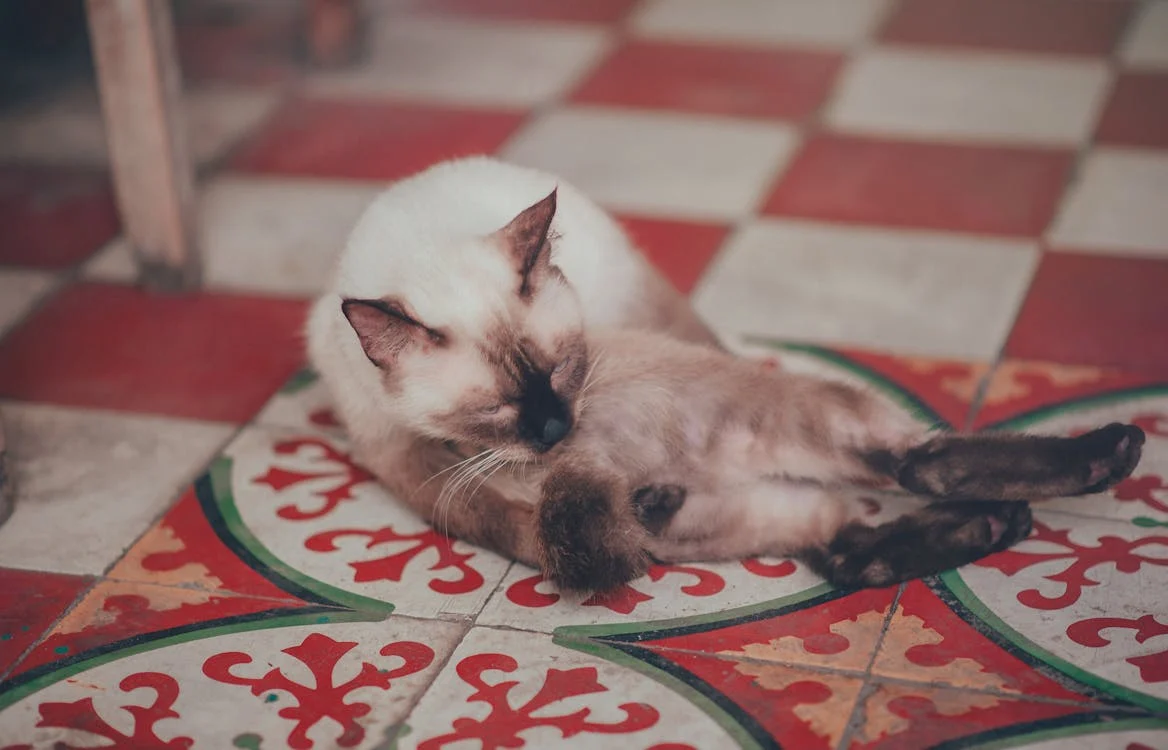In this article, we will delve into the behavior of Siamese cats to determine if they have a natural tendency for aggression. Understanding their temperament and behavior towards other cats and humans is crucial to ensure a harmonious relationship with these beautiful felines.
Understanding Siamese Cat Behavior
Siamese cats are known for their distinctive behavior and unique personalities. To truly understand these fascinating felines, we need to delve into the specific behaviors they display. By studying their body language, addressing their needs, and ensuring proper socialization, we can help prevent aggression and foster harmonious relationships.
Decoding Siamese Cat Body Language
Siamese cats have a rich repertoire of body language cues that can provide valuable insights into their mood and intentions. Here are some key cues to look out for:
- Ears: When a Siamese cat’s ears are erect and facing forward, it indicates curiosity and alertness. However, flattened or pinned-back ears can signify fear or aggression.
- Tail: A relaxed, gently wagging tail often demonstrates contentment, whereas an arched or puffed-up tail indicates fear or agitation. Rapid tail flicking may suggest annoyance or irritation.
- Purring: While purring is commonly associated with contentment, Siamese cats may also purr in stressful situations as a self-soothing mechanism.
Meeting Siamese Cats’ Needs
Siamese cats have specific needs that, when fulfilled, contribute to their overall well-being and help prevent behavioral issues. Attention and mental stimulation are crucial for these intelligent and social cats. Here are some essential needs to consider:
- Playtime: Regular play sessions with interactive toys can satisfy their high energy levels and prevent boredom. Engaging in play also provides an outlet for their natural hunting instincts.
- Vertical space: Siamese cats enjoy climbing and perching in high places. Providing vertical options like cat trees or shelves allows them to fulfill their climbing desires and feel secure.
- Social interaction: Siamese cats thrive on human companionship and can become lonely or anxious when left alone for long periods. Spending quality time with them and providing ample affection is vital for their emotional well-being.

The Importance of Socialization
Proper socialization plays a significant role in shaping a Siamese cat’s behavior and temperament. Early exposure to various people, animals, and environments helps them develop confidence and adaptability. This, in turn, reduces the likelihood of aggression towards unfamiliar stimuli in the future. Gradual and positive introductions can help ensure a well-adjusted and sociable Siamese cat.
“Understanding Siamese cat behavior is key to building a strong bond and creating a harmonious environment for these captivating companions.”
Handling Aggression in Siamese Cats
Siamese cats are known for their unique personalities and can display aggressive behavior in certain situations. Cat owners need to understand and manage this aggression to ensure a harmonious living environment. In this section, we will explore the potential causes of aggression in Siamese cats, such as territorial behavior, and provide tips for addressing and preventing aggressive tendencies.
Understanding Siamese Cat Aggression
Siamese cats can exhibit aggressive behavior due to various reasons. One common cause is territorial behavior, where they may become protective of their space and belongings. Additionally, Siamese cats are known to be highly social and may display aggression if they feel threatened or overwhelmed by other cats or unfamiliar humans.
Siamese cats are intelligent and curious creatures who often seek attention and interaction. They can become frustrated if their needs for mental stimulation and socialization are not met, which can manifest as aggression.
Addressing and Preventing Aggression
To handle aggression in Siamese cats, it is essential to provide them with proper care and attention. Here are some tips:
- Socialization: Start socializing your Siamese cat from a young age to ensure they are comfortable with other cats and humans. Gradually expose them to new experiences and environments.
- Positive Reinforcement: Use positive reinforcement techniques, such as treats and praise, to reward good behavior and discourage aggression. Avoid punishment, as it can exacerbate aggression.
- Environmental Enrichment: Provide your Siamese cat with toys, scratching posts, and interactive playtime to fulfill their need for mental and physical stimulation. A bored cat is more likely to display aggressive behavior.
- Neutering/Spaying: Consider having your Siamese cat neutered or spayed, as this can help reduce territorial aggression.
By implementing these strategies and ensuring a nurturing environment, you can help manage and prevent aggressive behavior in your Siamese cat.
Conclusion
Throughout this article, we have explored the behavior of Siamese cats and addressed the question of whether they are aggressive by nature. While they have a reputation for being temperamental, it is important to understand that aggression in Siamese cats is not inherent but can be influenced by various factors.
Siamese cats are known for their social and demanding nature, which can sometimes lead to perceived aggression. Understanding their body language, needs, and the importance of proper socialization is crucial in preventing aggressive behavior. Providing them with enough mental and physical stimulation can help keep their energy in check and reduce the risk of aggressive tendencies.
To handle aggression in Siamese cats, it is important to identify the underlying causes, such as territorial behavior or fear. Employing positive reinforcement techniques and ensuring they receive proper care and attention can go a long way in managing and preventing aggression. Remember, a happy and well-balanced Siamese cat is less likely to display aggressive behavior.
In summary, Siamese cats are not inherently aggressive, but their behavior can be influenced by their environment, socialization, and care. You can create a harmonious relationship with your Siamese cat by understanding their needs, providing appropriate stimulation, and ensuring a positive and supportive environment. Keep their happiness and well-being at the forefront, and aggression is less likely to be a concern.
FAQs
Q: Are Siamese Cats naturally aggressive?
A: Siamese Cats have a reputation for being mean, but aggression is not a natural characteristic of the breed. They can be demanding of their owner’s attention, but with proper care and attention, they can be loving and affectionate pets.
Q: How should I handle a Siamese kitten?
A: When handling a Siamese kitten, it’s important to be gentle and patient. They are delicate creatures and require a lot of care and attention. Make sure to socialize them early and provide them with plenty of toys and stimulation.
Q: Do Siamese cats need special care compared to other breeds?
A: Siamese cats have unique needs due to their breed characteristics. They are very social and need a lot of interaction with their owners. Make sure to keep them entertained and provide them with plenty of mental and physical stimulation.
Q: How can I train my Siamese cat?
A: Training a Siamese cat requires patience and consistency. Use positive reinforcement techniques and reward your cat with treats when they exhibit good behavior. Make sure to spend regular playtime with your Siamese to keep them mentally engaged.
Q: Are Siamese cats talkative?
A: Siamese cats are known for being vocal and talkative. They enjoy communicating with their owners through meows and other sounds. If you want a chatty companion, a Siamese cat might be the perfect fit for you.
Q: How can I ensure my Siamese cat is happy and fulfilled?
A: To keep your Siamese cat happy, make sure to provide them with plenty of toys, mental stimulation, and attention. They thrive on interaction and will be the happiest when they feel loved and cared for.
Q: Can Siamese cats be aggressive towards other pets?
A: Siamese cats can be territorial and may exhibit aggression towards other pets, especially if they feel threatened. It’s important to introduce new pets slowly and carefully to ensure a smooth transition and prevent any conflict.
